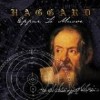 Despite a rich history dictating otherwise, the average music listeneris likely to express shock or, depending on the snobbery of saidlistener, outrage at the idea that classical compositions andtraditional metal are perfect compliments to each other. For nearly twodecades, most of metal's finest have at one time or another employedthe services of forward thinking conductors (and vice versa, anyoneremember the ballet scored by Entombed?) or, at the very least, broughta keyboardist on board in the attempt to simulate a string section. Andthen there is Haggard, one of the largest "bands" on the planetclocking in at just fewer than 20 full-time, classically trainedmembers and a vast roster of recurrent guest musicians assembled tobring the two worlds together like no other. On Eppur Si Muove, thecollective's fourth full-length in ten years, founder and mastermindAsis Nasseri and company have once again managed to combineconventional Northern European folk, galloping melodic metal, andoperatic themes to extraordinary effect. To accommodate the Galileanmotif (which almost explains the absurd art), Italian imagery andbaroque orchestration are prevalent throughout the album. Theirdedication to this is such that some pieces are sung in Italian,bringing the languages represented to four, including the group'snative German, Latin, and English. While logic might dictate that theextensive ground which Haggard traverse over the course of one albumwould sacrifice cohesion, this couldn't be more from the truthconsidering this is a band that has made a career out of it. The firsttrack, "All´inizio è La Morte," is as good a demonstration of this asany. Opening with a Latin choral/classical arrangement and gruff Germanvocals, the song explores more placid territory before crunchy electricguitars and Asis' menacing growl are introduced, only to give way to asoaring Soprano and lush strings, all of which are brought back intothe mix for a climax rarely found in single eight minute tracks. Whileit would take far more space than provided here to explore theintricacies of each of the other eight tracks, suffice it to say thesame level of complexity exists throughout this juggernaut.
Despite a rich history dictating otherwise, the average music listeneris likely to express shock or, depending on the snobbery of saidlistener, outrage at the idea that classical compositions andtraditional metal are perfect compliments to each other. For nearly twodecades, most of metal's finest have at one time or another employedthe services of forward thinking conductors (and vice versa, anyoneremember the ballet scored by Entombed?) or, at the very least, broughta keyboardist on board in the attempt to simulate a string section. Andthen there is Haggard, one of the largest "bands" on the planetclocking in at just fewer than 20 full-time, classically trainedmembers and a vast roster of recurrent guest musicians assembled tobring the two worlds together like no other. On Eppur Si Muove, thecollective's fourth full-length in ten years, founder and mastermindAsis Nasseri and company have once again managed to combineconventional Northern European folk, galloping melodic metal, andoperatic themes to extraordinary effect. To accommodate the Galileanmotif (which almost explains the absurd art), Italian imagery andbaroque orchestration are prevalent throughout the album. Theirdedication to this is such that some pieces are sung in Italian,bringing the languages represented to four, including the group'snative German, Latin, and English. While logic might dictate that theextensive ground which Haggard traverse over the course of one albumwould sacrifice cohesion, this couldn't be more from the truthconsidering this is a band that has made a career out of it. The firsttrack, "All´inizio è La Morte," is as good a demonstration of this asany. Opening with a Latin choral/classical arrangement and gruff Germanvocals, the song explores more placid territory before crunchy electricguitars and Asis' menacing growl are introduced, only to give way to asoaring Soprano and lush strings, all of which are brought back intothe mix for a climax rarely found in single eight minute tracks. Whileit would take far more space than provided here to explore theintricacies of each of the other eight tracks, suffice it to say thesame level of complexity exists throughout this juggernaut.
Two new shows just for you. We have squeezed out two extended release episodes for this weekend to get you through this week. They contain mostly new songs but there's also new issues from the vaults. The first show features music from Rider/Horse, Mint Field, Robert Aiki Aubrey Lowe, Anastasia Coope, ISAN, Stone Music, La Securite, Bark Psychosis, Jon Rose, Master Wilburn Burchette, Umberto, Wand, Tim Koh, Sun An, and Memory Drawings. The second episode has music by Laibach, Melt-Banana, Chuck Johnson, X, K. Yoshimatsu, Dorothy Carter, Pavel Milyakov, Violence Gratuite, Mark Templeton, Dummy, Endon, body / negative, Midwife, Alberto Boccardi, Divine. Cow in Maui from Veronika in Vienna. Get involved: subscribe, review, rate, share with your friends, send images! |



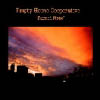 EHC started, essentially, as a casual outlet for an undefined number of active, Boston-area musicians. Boasting current and former members of the Thalia Zedek band, Willard Grant Conspiracy, The New Year, Molasses, and even Godspeed You Black Emperor, EHC enjoyed a humble genesis, organizing around brunch dates at the home of central member David Michael Curry. Since 1997, the group has attracted over 30 contributors in the creation of moody, improvisational music that bridges the gap between the potent emotional directness of its parent groups and the recklessness and vulnerability of the live setting.
EHC started, essentially, as a casual outlet for an undefined number of active, Boston-area musicians. Boasting current and former members of the Thalia Zedek band, Willard Grant Conspiracy, The New Year, Molasses, and even Godspeed You Black Emperor, EHC enjoyed a humble genesis, organizing around brunch dates at the home of central member David Michael Curry. Since 1997, the group has attracted over 30 contributors in the creation of moody, improvisational music that bridges the gap between the potent emotional directness of its parent groups and the recklessness and vulnerability of the live setting. In a just world David Thrussell would be one of Hollywood's top paidfilm score composers. In our world, however, he remains confined torelative obscurity, although he has several musical projects operatingconcurrently. His latest solo album as Black Lung, The Grand Chessboard, could easily be the soundtrack to a science fiction film. Although he often addresses social and political topics directly in hislyrics, this time Thrussell has chosen to present political issues onlyin the liner notes (in the form of several quotations dealing withAmerica's place in the overall global structure, from the book "TheGrand Chessboard" by Zbigniew Brzezinski). By making an instrumentalalbum, he has allowed the music to be timeless. It would have been easyto use samples of speeches made by world leaders, or other obviousreference points. Thrussell seems to understand that issues he hasaddressed in the past, such as Capitalism and vegetarianism, areongoing issues, and therefore music which deals with these topicsdirectly won't sound dated ten years from its creation. However, if hehad referenced the problems in today's global structure within themusic directly, it may have reduced the life span of the album.Musically, most of the album is based around repetitive, heavy,danceable rhythms, although there are abstract, beat-less sections,such as the last two minutes of "Despotic Heroic Diversion." Thrussellholds my interest, however, with the multitude of sounds and texturesthat he places on top of the beats. The music sounds linear instructure, yet it is constantly changing. During "Sickly SeratoninSqueeze," patterns shift and electronic sounds ooze out from all placeswithin the stereo field, while a constant 4/4 techno beat propels thetrack forward. The male and female choir voices used on "NeitherDominion Nor Exclusion" reveal that Thrussell has a wider range ofinfluences than most electronic producers. These voices bring to mindboth Greek theatre productions and the exotica of Les Baxter and MartinDenny. After almost five minutes of industrial techno beats, the last30 seconds of "The Multiple Contest" give way to percussion samplesthat recall Jerry Goldsmith's soundtrack to "Planet of the Apes". At 51minutes, The Grand Chessboard is just the right length to holdmy interest for its entire duration. Thrussell resists the temptationto fill the compact disc's 80 minute capacity. Instead he has presentedhis ideas in a concise ten tracks which are at once forward-thinkingand highly enjoyable to listen to.
In a just world David Thrussell would be one of Hollywood's top paidfilm score composers. In our world, however, he remains confined torelative obscurity, although he has several musical projects operatingconcurrently. His latest solo album as Black Lung, The Grand Chessboard, could easily be the soundtrack to a science fiction film. Although he often addresses social and political topics directly in hislyrics, this time Thrussell has chosen to present political issues onlyin the liner notes (in the form of several quotations dealing withAmerica's place in the overall global structure, from the book "TheGrand Chessboard" by Zbigniew Brzezinski). By making an instrumentalalbum, he has allowed the music to be timeless. It would have been easyto use samples of speeches made by world leaders, or other obviousreference points. Thrussell seems to understand that issues he hasaddressed in the past, such as Capitalism and vegetarianism, areongoing issues, and therefore music which deals with these topicsdirectly won't sound dated ten years from its creation. However, if hehad referenced the problems in today's global structure within themusic directly, it may have reduced the life span of the album.Musically, most of the album is based around repetitive, heavy,danceable rhythms, although there are abstract, beat-less sections,such as the last two minutes of "Despotic Heroic Diversion." Thrussellholds my interest, however, with the multitude of sounds and texturesthat he places on top of the beats. The music sounds linear instructure, yet it is constantly changing. During "Sickly SeratoninSqueeze," patterns shift and electronic sounds ooze out from all placeswithin the stereo field, while a constant 4/4 techno beat propels thetrack forward. The male and female choir voices used on "NeitherDominion Nor Exclusion" reveal that Thrussell has a wider range ofinfluences than most electronic producers. These voices bring to mindboth Greek theatre productions and the exotica of Les Baxter and MartinDenny. After almost five minutes of industrial techno beats, the last30 seconds of "The Multiple Contest" give way to percussion samplesthat recall Jerry Goldsmith's soundtrack to "Planet of the Apes". At 51minutes, The Grand Chessboard is just the right length to holdmy interest for its entire duration. Thrussell resists the temptationto fill the compact disc's 80 minute capacity. Instead he has presentedhis ideas in a concise ten tracks which are at once forward-thinkingand highly enjoyable to listen to.  Pure Trash's one flaw as an album is its lack of continuity.Despite attempts to reel it in, Dosh does let his emotions ebb and flowspontaneously, and the result is that his music takes an almostJoycian, stream of consciousness feel in their meanderings. Dosh keepsbetter focus on the outpouring of emotion that serves as his responseto Bill Cosby's Fatherhood, the EP Naoise. Named afterDosh's newborn son and created as a response to his conception, time inthe womb and eventual birth, the seven track disc includes remixes of"Naoise" and "Rock it to the next episode," two of the highlights from Pure Trash,as well as two live performances. One of which, "Contractions," is adelightful gem (though this reviewer allows it might not have been sofor Dosh's wife) that is as good as anything that Dosh has done.
Pure Trash's one flaw as an album is its lack of continuity.Despite attempts to reel it in, Dosh does let his emotions ebb and flowspontaneously, and the result is that his music takes an almostJoycian, stream of consciousness feel in their meanderings. Dosh keepsbetter focus on the outpouring of emotion that serves as his responseto Bill Cosby's Fatherhood, the EP Naoise. Named afterDosh's newborn son and created as a response to his conception, time inthe womb and eventual birth, the seven track disc includes remixes of"Naoise" and "Rock it to the next episode," two of the highlights from Pure Trash,as well as two live performances. One of which, "Contractions," is adelightful gem (though this reviewer allows it might not have been sofor Dosh's wife) that is as good as anything that Dosh has done.  Fog drummer and Minneapolis native Martin Dosh invites us in for yet another foray into his personal life on Pure Trash, the followup to 2003's Dosh (both on Anticon). Using the same formula that made Doshso inviting—a drum kit, a deliberately broken Fender Rhodes and an armyof samples, some chaotic, some organic, others adulterated by effectspedals, all filtered onto a basic eight track recorder—Dosh waxesinstrumental over twelve tracks about marriage, childbirth and thelarceny of the aforementioned beloved electric piano. The onlyvocalizations are the occasional sample from Dosh's wife andco-procreationist (whose assertion that "being pregnant and having ababy is not weird" opens up the album), his new son Naoise (who lendshis name to the ninth track and a more or less complementary EP), orthe gaggle of schoolchildren that Dosh teaches at his day job. Dosh'smusic, emotional as it is, thrives on a blend of subtlety and orderover spontaneity, using his careful choice of instrumentation to conveyemotion, whether it is mourning for his stolen Fender Rhodes (the fifthtrack, "Bye Rhodsy," is such an elegy) or dwelling upon marriage (thesurprisingly mournful but eventually uplifting sixth track,appropriately titled "I think I'm getting married"). Through his music,one can almost see and feel Dosh worry, love, laugh and cry. The resultis genuinely touching and thoughtful, without ever bordering ontriteness or over-sentimentality, quite a feat with such personalmaterial.
Fog drummer and Minneapolis native Martin Dosh invites us in for yet another foray into his personal life on Pure Trash, the followup to 2003's Dosh (both on Anticon). Using the same formula that made Doshso inviting—a drum kit, a deliberately broken Fender Rhodes and an armyof samples, some chaotic, some organic, others adulterated by effectspedals, all filtered onto a basic eight track recorder—Dosh waxesinstrumental over twelve tracks about marriage, childbirth and thelarceny of the aforementioned beloved electric piano. The onlyvocalizations are the occasional sample from Dosh's wife andco-procreationist (whose assertion that "being pregnant and having ababy is not weird" opens up the album), his new son Naoise (who lendshis name to the ninth track and a more or less complementary EP), orthe gaggle of schoolchildren that Dosh teaches at his day job. Dosh'smusic, emotional as it is, thrives on a blend of subtlety and orderover spontaneity, using his careful choice of instrumentation to conveyemotion, whether it is mourning for his stolen Fender Rhodes (the fifthtrack, "Bye Rhodsy," is such an elegy) or dwelling upon marriage (thesurprisingly mournful but eventually uplifting sixth track,appropriately titled "I think I'm getting married"). Through his music,one can almost see and feel Dosh worry, love, laugh and cry. The resultis genuinely touching and thoughtful, without ever bordering ontriteness or over-sentimentality, quite a feat with such personalmaterial.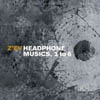 For this latest release, Z'ev entirely forgoes his familiar percussiveexperimentation in favor of a six-part cycle of tape music. It'sentitled Headphone Musics,and Z'ev seems pretty serious about the title, as he includes a ratherpetulant warning for reviewers: "If you can't be bothered to listen tothis music using headphones, please don't bother to write about it."Okay, point taken. I'm not one to disobey a direct order, so I madesure to listen on my most expensive pair of headphones. The six piecesare all between seven and nine minutes long, each one a densearchitecture of multilayered sound drawn from Z'ev's vast archive oftapes amassed over the last 30 years. Z'ev's website(http://www.rhythmajik.com/) gives extensive details on the sourcerecordings and other elements that went into the making of each track,and while it's all very interesting, I'm not sure it changes thelistening experience in any profound way. Many of these sounds havebeen slowed-down and sped-up, rendering them unrecognizable in thedensely populated mixdown of each track. What comes through on each ofthese pieces is Z'ev's unique ear for harmonics and atmosphere, deftlycombining disparate elements into walls of amorphously beautiful sound.For those who can stand this sort of thing, Headphone Musics isone of the better albums of tape manipulation to see release in recentyears, from the standpoint of the average, non-academically mindedlistener. Though most musique concrête composers have begun toincorporate digital production techniques into their repertoire, Z'evchooses to retain the purity of classic tape editing techniques, whichgives the music a warmer analog feel, with plenty of hiss anddistortion. Track one utilizes various recordings of dripping andrunning water to create a dark, immersive environment that envelops thelistener. The time-stretched croaks of Balinese tree frogs are layeredto hypnotic effect on the second track, which plays like a fieldrecording from an as-yet-undiscovered subterranean jungle. Track fourwas my favorite, drawn from various obscure sources, most notably thesinging of a shaman from a now-extinct tribe of Malaccan Indians. Z'evuses layers of distortion and complex phase shifts to transform thetrack into a regressive mind-trip back through the genetic memory ofprevious evolutionary phases. Tacked onto the end of the album is aseven-minute recording from 1976 entitled "As Is As," a tape-heavyfragment from a live sound poetry performance. The performance involvedthe simultaneous live manipulation of several vintage reel-to-reel tapeplayers playing indecipherable vocal loops. It's a fascinating piece ofvintage Z'ev arcana, and underscores just how long he's been doing thiskind of thing; a true veteran of mind-blowing Industrial-strengthexperimentalism.
For this latest release, Z'ev entirely forgoes his familiar percussiveexperimentation in favor of a six-part cycle of tape music. It'sentitled Headphone Musics,and Z'ev seems pretty serious about the title, as he includes a ratherpetulant warning for reviewers: "If you can't be bothered to listen tothis music using headphones, please don't bother to write about it."Okay, point taken. I'm not one to disobey a direct order, so I madesure to listen on my most expensive pair of headphones. The six piecesare all between seven and nine minutes long, each one a densearchitecture of multilayered sound drawn from Z'ev's vast archive oftapes amassed over the last 30 years. Z'ev's website(http://www.rhythmajik.com/) gives extensive details on the sourcerecordings and other elements that went into the making of each track,and while it's all very interesting, I'm not sure it changes thelistening experience in any profound way. Many of these sounds havebeen slowed-down and sped-up, rendering them unrecognizable in thedensely populated mixdown of each track. What comes through on each ofthese pieces is Z'ev's unique ear for harmonics and atmosphere, deftlycombining disparate elements into walls of amorphously beautiful sound.For those who can stand this sort of thing, Headphone Musics isone of the better albums of tape manipulation to see release in recentyears, from the standpoint of the average, non-academically mindedlistener. Though most musique concrête composers have begun toincorporate digital production techniques into their repertoire, Z'evchooses to retain the purity of classic tape editing techniques, whichgives the music a warmer analog feel, with plenty of hiss anddistortion. Track one utilizes various recordings of dripping andrunning water to create a dark, immersive environment that envelops thelistener. The time-stretched croaks of Balinese tree frogs are layeredto hypnotic effect on the second track, which plays like a fieldrecording from an as-yet-undiscovered subterranean jungle. Track fourwas my favorite, drawn from various obscure sources, most notably thesinging of a shaman from a now-extinct tribe of Malaccan Indians. Z'evuses layers of distortion and complex phase shifts to transform thetrack into a regressive mind-trip back through the genetic memory ofprevious evolutionary phases. Tacked onto the end of the album is aseven-minute recording from 1976 entitled "As Is As," a tape-heavyfragment from a live sound poetry performance. The performance involvedthe simultaneous live manipulation of several vintage reel-to-reel tapeplayers playing indecipherable vocal loops. It's a fascinating piece ofvintage Z'ev arcana, and underscores just how long he's been doing thiskind of thing; a true veteran of mind-blowing Industrial-strengthexperimentalism. Kevin Doria and Joe Denardo obliterate sense perceptions and blur them together. The Sky's Run Into the Seaharmonized elements of melody, noise, and stasis and produced a recordthat lilted in and out of consciousness, almost as though it weredesigned to be a meditative piece for self pursuit. Growing's newestrecord, however, is only interested in destruction or defragmentationand though it allows for moments of recognizable movement and melody,it more often than not rearranges music so that it will erase memoryand allow for genuine and direct communication with the soul. The Soul of the Rainbow and the Harmony of Lightis a name taken from an essay that is concerned with how colors andsounds relate, but I'm rarely reminded of colors on any of these songs.If nothing else, this record slowly transcends visual representationand drifts off into the purity of the blinding sun by the closingseconds. "Onement" opens with the suggestion that something familiar isgoing to happen. Just as The Sky's Run... opened with trilled guitar notes fluttering about freely, The Soul of the Rainbow...begins with a glimmer: a last impression of the earthly terrain andthen slowly progresses into the non-distinct, the absolutelyimpossible, and the pure. By the end it has become a circulating rumbleof metallic warmth and uneasy hum—and it does not resolve itself intosomething relieving. "Anaheim II" is a torrential assault of guitarnoise that boils at a thousand degrees and always feels as though it isabout to break down and fall apart altogether. At the same time itfeels amazingly still and in its persistence it comes to represent apure white nothingness that burns as it exists. This incredible burninggives way to the more tangible "Epochal Reminiscence." The firstseveral minutes make it seem as though this is simply going to be aslightly less confrontational moment of clarity, but then guitars beginto slide and move and create melodies and the song takes on an entirelydistinct identity. It's an astounding compression of the ugly and thebeautiful; the buzzing alone would be unbearable if it weren't for thesoft and subtle shifts in harmonic emphasis. The sound of birdschirping and water running open the final track and despite anyreference to the familiar and gentle that this might invoke, the wavesof sound present are everything but simple. There's a low hum ofaggression buried in the throbbing moans of guitar that fade in and outlike a bell on "Primitive Associations/Great Mass Above." The songfeels almost deceptively calm. It's as though something intense anddevestating is to be expected after all the chaos that has come beforeit. As the track proceeds it becomes brighter and brighter, until itbecomes virtually invisble/inaudible and it breaks away into the realmof ghosts and speculation.
Kevin Doria and Joe Denardo obliterate sense perceptions and blur them together. The Sky's Run Into the Seaharmonized elements of melody, noise, and stasis and produced a recordthat lilted in and out of consciousness, almost as though it weredesigned to be a meditative piece for self pursuit. Growing's newestrecord, however, is only interested in destruction or defragmentationand though it allows for moments of recognizable movement and melody,it more often than not rearranges music so that it will erase memoryand allow for genuine and direct communication with the soul. The Soul of the Rainbow and the Harmony of Lightis a name taken from an essay that is concerned with how colors andsounds relate, but I'm rarely reminded of colors on any of these songs.If nothing else, this record slowly transcends visual representationand drifts off into the purity of the blinding sun by the closingseconds. "Onement" opens with the suggestion that something familiar isgoing to happen. Just as The Sky's Run... opened with trilled guitar notes fluttering about freely, The Soul of the Rainbow...begins with a glimmer: a last impression of the earthly terrain andthen slowly progresses into the non-distinct, the absolutelyimpossible, and the pure. By the end it has become a circulating rumbleof metallic warmth and uneasy hum—and it does not resolve itself intosomething relieving. "Anaheim II" is a torrential assault of guitarnoise that boils at a thousand degrees and always feels as though it isabout to break down and fall apart altogether. At the same time itfeels amazingly still and in its persistence it comes to represent apure white nothingness that burns as it exists. This incredible burninggives way to the more tangible "Epochal Reminiscence." The firstseveral minutes make it seem as though this is simply going to be aslightly less confrontational moment of clarity, but then guitars beginto slide and move and create melodies and the song takes on an entirelydistinct identity. It's an astounding compression of the ugly and thebeautiful; the buzzing alone would be unbearable if it weren't for thesoft and subtle shifts in harmonic emphasis. The sound of birdschirping and water running open the final track and despite anyreference to the familiar and gentle that this might invoke, the wavesof sound present are everything but simple. There's a low hum ofaggression buried in the throbbing moans of guitar that fade in and outlike a bell on "Primitive Associations/Great Mass Above." The songfeels almost deceptively calm. It's as though something intense anddevestating is to be expected after all the chaos that has come beforeit. As the track proceeds it becomes brighter and brighter, until itbecomes virtually invisble/inaudible and it breaks away into the realmof ghosts and speculation.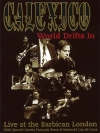 There's
not a lot of concert performances that I make a point of
owning; however this one is an exception. A few months prior to
releasing their 2003 Feast of Wire disc, Calexico took to the road with
their augmented touring group, captured brilliantly in performance on
this DVD. World Drifts In: Live at the Barbican London
is an extra special evening as they'd brought along the wonderful group
Mariachi Luz de Luna from their home town of Tucson, AZ to add an
authentic flavor to their sound. Shot on video, which for this occasion
looks better than film would, this exciting performance from November
27, 2002 is nicely edited together from several angles, including one
of my favorites: right beside drummer John Convertino. Anyone that's
seen the band live can attest to his mastery of the trapkit, which is a
joy to watch. The crystal clear sound appears to be a direct line from
the soundboard, with some room mikes capturing the ambience. There are
a few moments when Joey Burns' splendid vocal performances on the newer
tunes sound better than on what would be their new disc, which seems
hard to believe. At 90 minutes, the material performed spans their
short yet rich career, including a few traditional Mexicali numbers
which highlight the Mariachi Luz de Luna's members as well as a
traditional-sounding French number featuring chanteuse, Françoiz Breut.
In addition to the performance, the DVD includes an additional hour's
worth of extras which include homestyle/silent movies (set to Calexico
tunes) of the band's 2003 European tour, interviews from the road with
various members of the touring posse and excerpts from the making of
Feast of Wire.
Of course, videos for "The Black Light," "Ballad of Cable Hogue," and
"Crystal Frontier" are included, which up to now I'd only seen as
Quicktime files on various EPs. Also included is a humorous two-minute
cartoon featuring the group's music and a brief documentary (shot by
Señor Burns) which covers the origins of Mariachi through interviews
with members of Mariachi Luz de Luna. I understand that this DVD has
been available in the UK and Europe for a number of months now, as if
to mock those of us in Region 1. Calexico put on one of the best
performances I've seen in recent years, though in a club exceptionally
smaller than the Barbican. Not surprisingly, although the performance
on this DVD is nothing but stellar, it still doesn't top being
there—but it comes awfully close.
There's
not a lot of concert performances that I make a point of
owning; however this one is an exception. A few months prior to
releasing their 2003 Feast of Wire disc, Calexico took to the road with
their augmented touring group, captured brilliantly in performance on
this DVD. World Drifts In: Live at the Barbican London
is an extra special evening as they'd brought along the wonderful group
Mariachi Luz de Luna from their home town of Tucson, AZ to add an
authentic flavor to their sound. Shot on video, which for this occasion
looks better than film would, this exciting performance from November
27, 2002 is nicely edited together from several angles, including one
of my favorites: right beside drummer John Convertino. Anyone that's
seen the band live can attest to his mastery of the trapkit, which is a
joy to watch. The crystal clear sound appears to be a direct line from
the soundboard, with some room mikes capturing the ambience. There are
a few moments when Joey Burns' splendid vocal performances on the newer
tunes sound better than on what would be their new disc, which seems
hard to believe. At 90 minutes, the material performed spans their
short yet rich career, including a few traditional Mexicali numbers
which highlight the Mariachi Luz de Luna's members as well as a
traditional-sounding French number featuring chanteuse, Françoiz Breut.
In addition to the performance, the DVD includes an additional hour's
worth of extras which include homestyle/silent movies (set to Calexico
tunes) of the band's 2003 European tour, interviews from the road with
various members of the touring posse and excerpts from the making of
Feast of Wire.
Of course, videos for "The Black Light," "Ballad of Cable Hogue," and
"Crystal Frontier" are included, which up to now I'd only seen as
Quicktime files on various EPs. Also included is a humorous two-minute
cartoon featuring the group's music and a brief documentary (shot by
Señor Burns) which covers the origins of Mariachi through interviews
with members of Mariachi Luz de Luna. I understand that this DVD has
been available in the UK and Europe for a number of months now, as if
to mock those of us in Region 1. Calexico put on one of the best
performances I've seen in recent years, though in a club exceptionally
smaller than the Barbican. Not surprisingly, although the performance
on this DVD is nothing but stellar, it still doesn't top being
there—but it comes awfully close.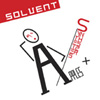 Jason Amm wants me to believe that there is some heart to be found left behind in the 1980s and that it can be transformed and shaped into a potent stew of consistent and modern excellence. I don't believe him entirely. There's plenty of good music to be found on Amm's latest; a few tracks stand head and shoulders above the rest, though, and this makes it an uneven album. The bad that comes with the good is annoyingly bad. The worst tracks are a reminder of how stale and mechanical music can be.
Jason Amm wants me to believe that there is some heart to be found left behind in the 1980s and that it can be transformed and shaped into a potent stew of consistent and modern excellence. I don't believe him entirely. There's plenty of good music to be found on Amm's latest; a few tracks stand head and shoulders above the rest, though, and this makes it an uneven album. The bad that comes with the good is annoyingly bad. The worst tracks are a reminder of how stale and mechanical music can be.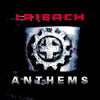 Essentially a formulaic, gimmicky act that only occasionally impresses,Laibach's long career has largely been defined, as well as hindered, bywhat the New York Times once called a "crypto-totalitarianism" thatpervades its work. The project's dubious perceived politics, oftensimultaneously inferred and contradicted by the collective's murkyartistic ethos and unbelievable over-the-top theatrics, injected a doseof controversy into their overblown music, guaranteeing them attentionfrom listeners on both sides of the ideological spectrum. Anthems,a dual disc retrospective of the Slovenian band's two decades of work,chronologically works backwards, beginning with a bouncy, danceableremix of "Das Spiel Ist Aus," the second single off last year'ssurprising and impressive 'WAT' album. Also from that album, "Tanz MitLaibach", arguably the best track ever to come from the band, finallygets the blend of pounding techno and bombastic eurocentricism right,after years of prior attempts with largely sketchy results. Continuingon, forgettable numbers like "Alle Gegen Alle" and "Wirtschaft Ist Tot"set the tone for the overall mediocrity that pervades the rest of thisdisc. "God Is God" indulges in tiresome KMFDM-styled guitar riffs overrepetitive beats and an all-too-familiar male chorus, while the quirkyformer club staple "Geburt Einer Nation" brings back vivid memories ofNew York City goth/industrial nightclubs with its populist march. Ofcourse, a handful of their notorious and downright laughable coversongs (The Beatles' "Get Back" and Europe's "Final Countdown", amongothers) made the cut and those Germanic Cookie Monster vocals that areso undeniably Laibach only intensify just how embarassing these trackstruly are. Fortunately, Laibach sheds some of the hokey stigma whenscales back its excessive use of orchestral elements, as displayed bythe inclusion of earlier tracks such as "Die Liebe" and "Brat Moj". Thesecond disc, comprised of previously available as well as unreleasedremixes of Laibach material, is largely unimpressive, though there area couple of notable exceptions. "Wir Tanzen Ado Hinkel", the ZetaReticula remix of "Tanz Mit Laibach", strips back the intensity of theoriginal, treating the vocals with a robotic-sounding effect and layingdown beats of an equally mechanical quality. Juno Reactor actuallymakes "Final Countdown" remarkably listenable with an invigoratingfloorfiller akin to his mid-nineties material and should certainlyplease anyone familiar with his pre-"Pistolero" work. All in all, Anthemsis a fair, but ultimately unsuccessful, attempt by Mute to hype up andglorify the backcatalog of a largely mediocre, self-indulgent act. Thisnew entry in the probably EMI-influenced pillaging of the Muteindustrial archives of the 1990s fails to meet the mark set by therecent projects set forth for infinitely more worthy acts likeThrobbing Gristle and Cabaret Voltaire.
Essentially a formulaic, gimmicky act that only occasionally impresses,Laibach's long career has largely been defined, as well as hindered, bywhat the New York Times once called a "crypto-totalitarianism" thatpervades its work. The project's dubious perceived politics, oftensimultaneously inferred and contradicted by the collective's murkyartistic ethos and unbelievable over-the-top theatrics, injected a doseof controversy into their overblown music, guaranteeing them attentionfrom listeners on both sides of the ideological spectrum. Anthems,a dual disc retrospective of the Slovenian band's two decades of work,chronologically works backwards, beginning with a bouncy, danceableremix of "Das Spiel Ist Aus," the second single off last year'ssurprising and impressive 'WAT' album. Also from that album, "Tanz MitLaibach", arguably the best track ever to come from the band, finallygets the blend of pounding techno and bombastic eurocentricism right,after years of prior attempts with largely sketchy results. Continuingon, forgettable numbers like "Alle Gegen Alle" and "Wirtschaft Ist Tot"set the tone for the overall mediocrity that pervades the rest of thisdisc. "God Is God" indulges in tiresome KMFDM-styled guitar riffs overrepetitive beats and an all-too-familiar male chorus, while the quirkyformer club staple "Geburt Einer Nation" brings back vivid memories ofNew York City goth/industrial nightclubs with its populist march. Ofcourse, a handful of their notorious and downright laughable coversongs (The Beatles' "Get Back" and Europe's "Final Countdown", amongothers) made the cut and those Germanic Cookie Monster vocals that areso undeniably Laibach only intensify just how embarassing these trackstruly are. Fortunately, Laibach sheds some of the hokey stigma whenscales back its excessive use of orchestral elements, as displayed bythe inclusion of earlier tracks such as "Die Liebe" and "Brat Moj". Thesecond disc, comprised of previously available as well as unreleasedremixes of Laibach material, is largely unimpressive, though there area couple of notable exceptions. "Wir Tanzen Ado Hinkel", the ZetaReticula remix of "Tanz Mit Laibach", strips back the intensity of theoriginal, treating the vocals with a robotic-sounding effect and layingdown beats of an equally mechanical quality. Juno Reactor actuallymakes "Final Countdown" remarkably listenable with an invigoratingfloorfiller akin to his mid-nineties material and should certainlyplease anyone familiar with his pre-"Pistolero" work. All in all, Anthemsis a fair, but ultimately unsuccessful, attempt by Mute to hype up andglorify the backcatalog of a largely mediocre, self-indulgent act. Thisnew entry in the probably EMI-influenced pillaging of the Muteindustrial archives of the 1990s fails to meet the mark set by therecent projects set forth for infinitely more worthy acts likeThrobbing Gristle and Cabaret Voltaire.
